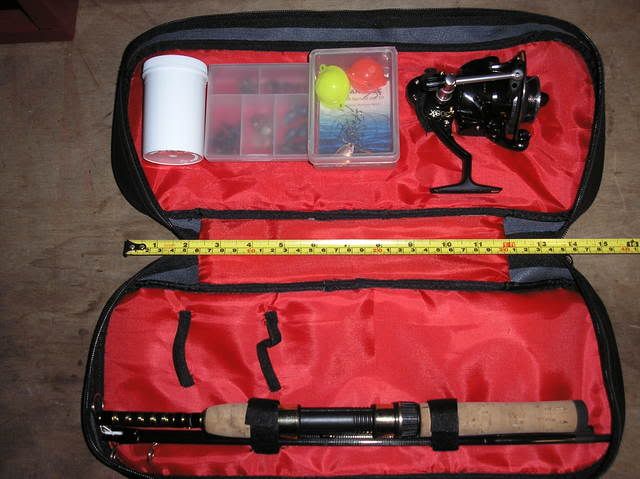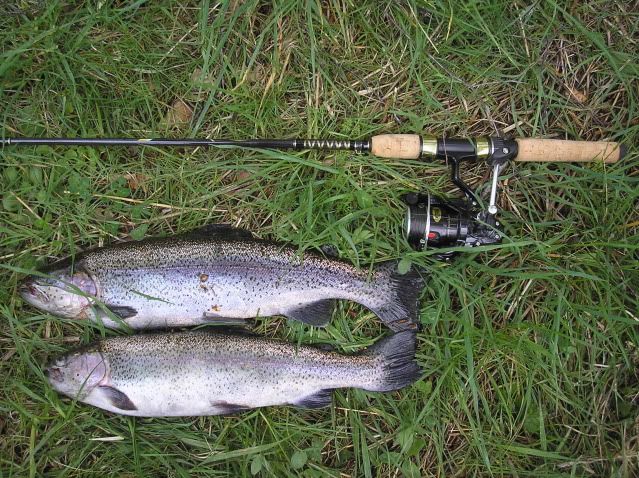Okay so you want to catch fish but don't know how? Read on for a basic introduction and demystification of the art of freshwater fishing.
Tools.
In the UK it is illegal to fish on freshwater without a rod. So you will need a rod and reel.
Any cheap spinning rod will do to start with but a telscopic rod will be easier to transport and look after than a rod that you may have to carry in 2 or so separate sections. The exception to this is a travel rod which may come in as many as 5 or 6 sections and be very small to carry. Expect to pay around £10-20 on a rod. What you are after is a trout rod, so you don't need the heavy weight ones, unless you are of course after salmon or pike.
You will also need a spinning reel. If you intend to fish in the sea, you will need to buy a sea fishing reel which is salt corrosian resistant but these tend to be much bulkier than freshwater reels. A reel can cost as little as £7 but like anything in life you generally get what you pay for. It is worth buying a good quality reel as this is the tool that will be doing the most work and you want it to be tough and reliable.
Putting all that asside if you only intend to do one or two trips a year, a telescopic rod and reel combo out of Liddles for a tenner will get you by (just), or you can buy a combo kit for around £20 in a plastic travel case which will be n aweful lot better.
This is my combo set up.
The rod is just a cheap £10 but the reel is very good quality but expensive
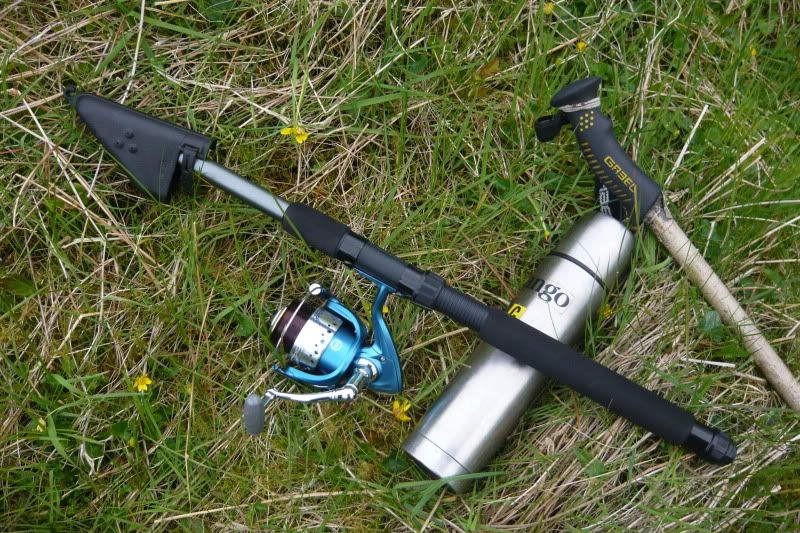
The flask is optional
Next you will need swivels clips and lures. Swivel clips are just like tiny carabinas that have a rotating clip and eye. One gets tied to the end of your line for the easy attachment and removal of lures and these help prevent your line twisting and getting into fankles. I keep my lures and swivels in a small box that opens out into compartments. That way I can carry the lures without fear of them getting caught in me, my dog or anything else.
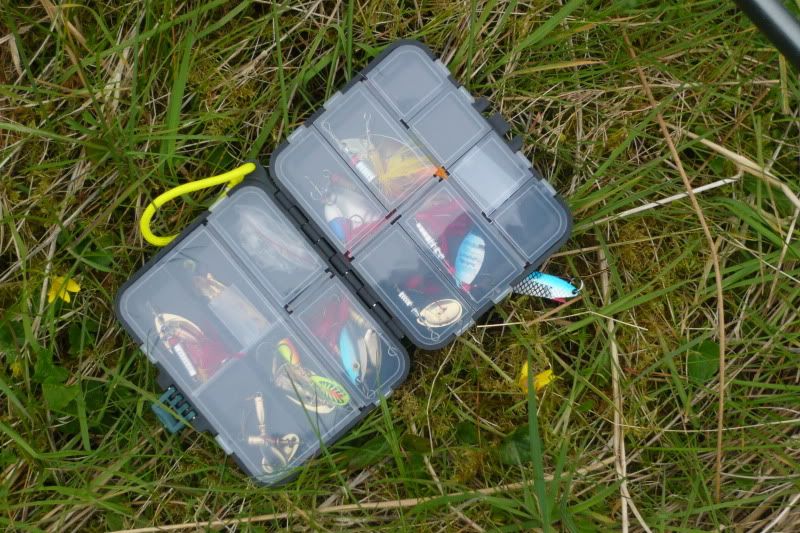
Lures come in wide variety of different types and can be expensive. Essentially they can be mimics of natural bait like small fish or they can spin and tumble in the water and act on the aggressive nature of predatory fish. If it's shiny and swims past a hungry fish, the fish may just grab it and they often do. Spinners, spoons and toby's act in this way to some extent. They may be shaped like the end of a tea spoon or a small twisted length of flat metal and they come in a huge variety of colours and weights. Most have an eye on one end to attach to the swivel clip and on the other a treble hook.
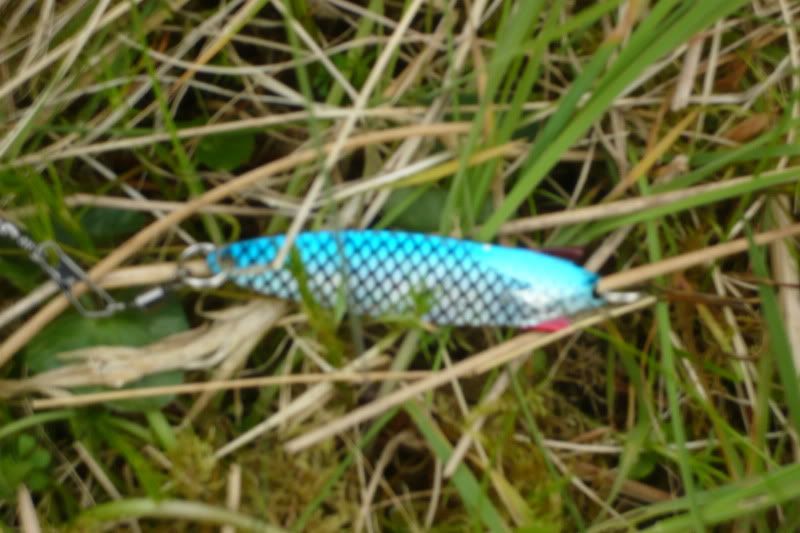
Now we can go fishing in some cool places...
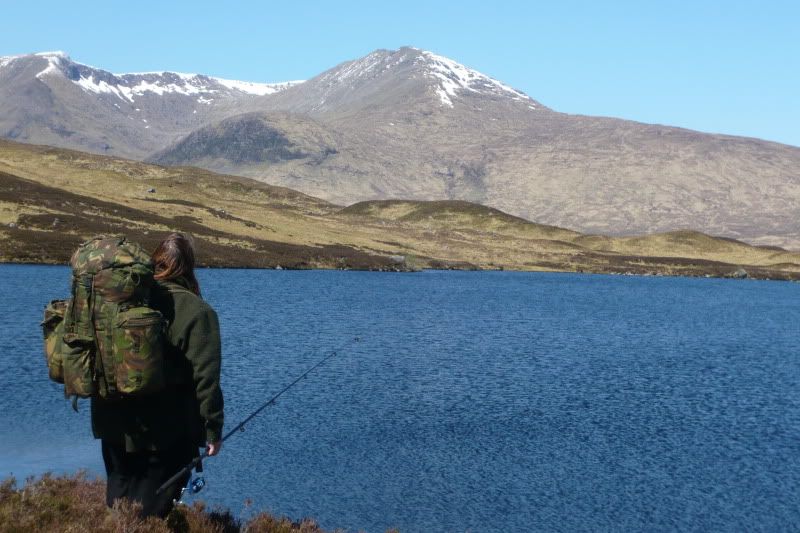
Or just our local hill Lochs
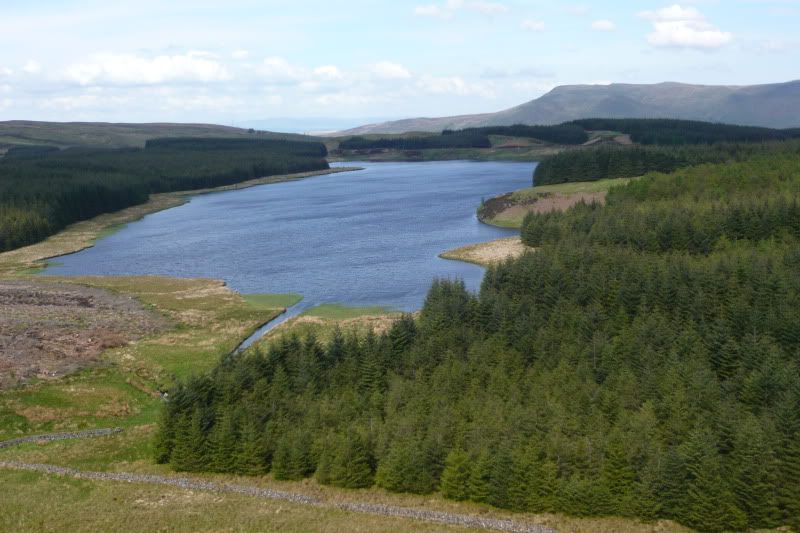
Either way where's there's water there's usually fish!
Ask someone to show you how to set up your rod and reel if you haven't worked it out. It's easy. All you do is take the line from the reel and place it on one side or the other of the bail arm ( the metal hoop over the reel), you'll know it's on the right side by reeling in some line, if it reels in then it's on the right side, if it doesn't put it on the other side of the wire clip.
Thread the line through the eyes of your rod and then attach a swivel clip to the end of your line using a fishermans knot. I'm assuming as this isa bushy site that you know your knots

Now choose your lure and clip it on to the line and start casting out your lure and slowly retrieving it. Most people retrieve their lures too quickly so slow down and aim to cover as much water as possible; you need to search out the fish and keep moving while covering as much of the water as possible. Look for fishy areas, where there's weed, where you see fish rising, where small burns run into Lochs etc. Sooner or later you'll get a hit and you can start winding your fish in. Be prepared to catch a lot of small trout and perch as well as other course fish depending on where you are. If there are pike in the water you will need a length of wire on the end of your line called a trace incase you catch one;this prevents the pike from biting through the line. And be prepared to lose spinners, it's inevitable to a degree. Pound shops sell spinners in packets and these work just as well as the mor eexpensive ones in fishing shops, the next picture proves that!
In this case a small trout (I put all my small trout back and only keep the bigger ones for food)
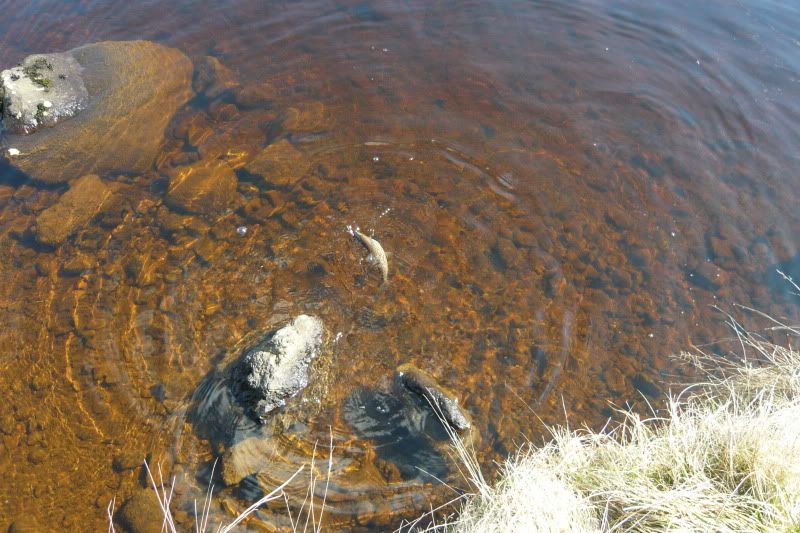
Or a perch ( they are edible too)
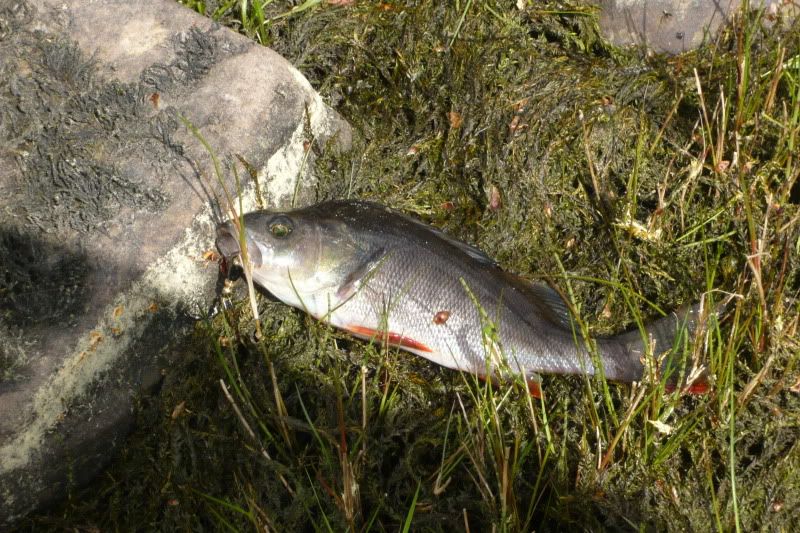
More to follow...
Enjoy
WS
Tools.
In the UK it is illegal to fish on freshwater without a rod. So you will need a rod and reel.
Any cheap spinning rod will do to start with but a telscopic rod will be easier to transport and look after than a rod that you may have to carry in 2 or so separate sections. The exception to this is a travel rod which may come in as many as 5 or 6 sections and be very small to carry. Expect to pay around £10-20 on a rod. What you are after is a trout rod, so you don't need the heavy weight ones, unless you are of course after salmon or pike.
You will also need a spinning reel. If you intend to fish in the sea, you will need to buy a sea fishing reel which is salt corrosian resistant but these tend to be much bulkier than freshwater reels. A reel can cost as little as £7 but like anything in life you generally get what you pay for. It is worth buying a good quality reel as this is the tool that will be doing the most work and you want it to be tough and reliable.
Putting all that asside if you only intend to do one or two trips a year, a telescopic rod and reel combo out of Liddles for a tenner will get you by (just), or you can buy a combo kit for around £20 in a plastic travel case which will be n aweful lot better.
This is my combo set up.
The rod is just a cheap £10 but the reel is very good quality but expensive

The flask is optional

Next you will need swivels clips and lures. Swivel clips are just like tiny carabinas that have a rotating clip and eye. One gets tied to the end of your line for the easy attachment and removal of lures and these help prevent your line twisting and getting into fankles. I keep my lures and swivels in a small box that opens out into compartments. That way I can carry the lures without fear of them getting caught in me, my dog or anything else.

Lures come in wide variety of different types and can be expensive. Essentially they can be mimics of natural bait like small fish or they can spin and tumble in the water and act on the aggressive nature of predatory fish. If it's shiny and swims past a hungry fish, the fish may just grab it and they often do. Spinners, spoons and toby's act in this way to some extent. They may be shaped like the end of a tea spoon or a small twisted length of flat metal and they come in a huge variety of colours and weights. Most have an eye on one end to attach to the swivel clip and on the other a treble hook.

Now we can go fishing in some cool places...

Or just our local hill Lochs

Either way where's there's water there's usually fish!
Ask someone to show you how to set up your rod and reel if you haven't worked it out. It's easy. All you do is take the line from the reel and place it on one side or the other of the bail arm ( the metal hoop over the reel), you'll know it's on the right side by reeling in some line, if it reels in then it's on the right side, if it doesn't put it on the other side of the wire clip.
Thread the line through the eyes of your rod and then attach a swivel clip to the end of your line using a fishermans knot. I'm assuming as this isa bushy site that you know your knots

Now choose your lure and clip it on to the line and start casting out your lure and slowly retrieving it. Most people retrieve their lures too quickly so slow down and aim to cover as much water as possible; you need to search out the fish and keep moving while covering as much of the water as possible. Look for fishy areas, where there's weed, where you see fish rising, where small burns run into Lochs etc. Sooner or later you'll get a hit and you can start winding your fish in. Be prepared to catch a lot of small trout and perch as well as other course fish depending on where you are. If there are pike in the water you will need a length of wire on the end of your line called a trace incase you catch one;this prevents the pike from biting through the line. And be prepared to lose spinners, it's inevitable to a degree. Pound shops sell spinners in packets and these work just as well as the mor eexpensive ones in fishing shops, the next picture proves that!

In this case a small trout (I put all my small trout back and only keep the bigger ones for food)

Or a perch ( they are edible too)

More to follow...
Enjoy
WS

